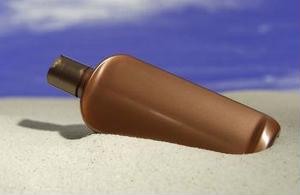
The U.S. Food and Drug Administration (FDA) recently ruled that a sunscreen must protect against both UVA and UVB rays in order for it to be labeled "broad spectrum." Additionally, such products may also include labels that inform consumers about the cancer-preventing benefits of broad spectrum sunscreen.
Dermatologist Julie Pena said that many people are unaware that UVA rays may be even more dangerous than the sunburn-causing UVB rays, which almost all sunscreens protect from.
“SPF has nothing to do with UVA protection,” said Pena. “UVA does everything bad UVB does and more. It causes skin cancer and aging of the skin.”
Additionally, the FDA proposed a ban on labeling sunscreens as having an SPF of higher than 50, since these products have not been shown to offer any protection.
African American women may have a tendency to forego sunscreen because they feel as though their ethnic skin gives them adequate protection from the sun. While the prevalence of skin cancer in this population is lower than among Caucasians, the disease tends to be more deadly for people with dark skin. Skin care products for black skin that include sun protection may help these individuals to avoid melanoma and other carcinomas.







No comments:
Post a Comment